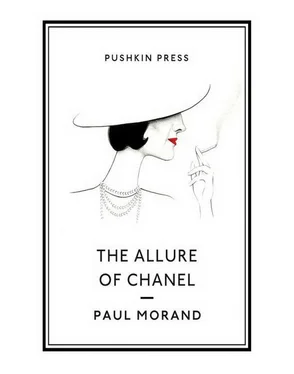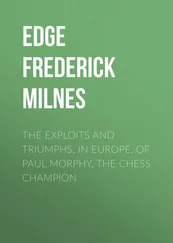I behaved properly in front of strangers. The local people used to say: “Little Coco has good manners”. I was well brought up, like a dog that has been well trained. I kept my fits of madness to myself, except for one occasion when I slid down the banisters and landed in the middle of the drawing room, among the guests. If I was given a five-franc coin, I would squander it on presents. “You’ll end up poor,” my aunts kept on saying.
Another aunt of mine, my father’s sister, who was much younger than the others and was beautiful, with long hair, would sometimes come to the house.
“We’re going to take tea,” I would say.
“Tea? Where have you heard about taking tea?” asked the other aunts.
“In the fashion magazines. In Paris, they take tea; whether you like it or not, that’s what happens. There’s a whole ceremony. You place the teapot beneath a ‘cosy’; that’s what it’s called. You invite your friends; you serve them from an embroidered table mat.”
“Coco, you’re crazy!”
“I want tea.”
“There isn’t any.”
“The chemist has some.”
When I got my tea, my Aunt Adrienne said:
“Let’s play at being ladies. Strong or weak?”
“I don’t want to.”
“Ladies don’t say ‘I don’t want to’.”
“What do you mean by ladies?”
“Those in ‘aristocratic circles’.”
“Who will take us there?”
We drained our cups. I ventured to ask my Aunt Adrienne:
“Apart from ladies, who goes to tea parties?”
“Elegant men, those who do nothing; they are far more handsome than those who work.”
“Don’t they do anything?”
“You should see them … They do lots of things.”
“Adrienne, leave the child alone; you’ll bewilder her.”
My aunts owned some grazing land, for they had a little property; fields of close-cropped grass, which were poor for producing milk, but very much enjoyed by horses. They bred horses, in the most basic sort of way, which meant allowing the animals to graze freely. They sold their best products to the army (who, then, spoke about the infantry!). Untameable, like our chickens, I ran all over our farm buildings with the little peasant children. I mounted our horses bare-back (at sixteen, I had never seen a saddle), I caught hold of our best animals (or occasionally other people’s, as I fancied) by their manes or their tails. I stole all the carrots from the house to feed them. How I loved it when the handsome soldiers did their rounds, and the visits of the cavalry officers who came to see our herd. Fine hussars or chasseurs, with sky-blue dolmans and black frogging, and their pelisses on their shoulders. They came every year in their beautifully harnessed phaetons; they looked in the horses’ mouths to see how old they were, stroked their fetlocks to check that they weren’t inflamed, and slapped their flanks; it was a great party; a party that for me was fraught with a degree of anxiety: supposing they were going to take my favourite horses away from me? But they didn’t choose them; they were careful not to, for I had made them gallop so much on hard and flinty ground while they were unshod and in the fields, that their feet had been affected. I can still see the officer coming into our house, after the inspection, and warming himself by the kitchen hearth: “These horses have hooves like cattle, their soles have gone and their frogs are rotten!” he said, referring to our best-looking creatures. I no longer dared to look the officer in the eye, but he had seen through me; as soon as my aunts had turned away, he whispered in a low voice: “So you’ve been galloping without shoes, eh, you little rascal?”
It’s not that I love horses. I’ve never been like the ‘horsey folk’ who groom them and comb them for fun, or like the Englishwomen who, as soon as they have a spare moment, spend it in the stable.
Yet it is nevertheless true that horses have influenced the course of my life.
This is how:
It so happened that my aunts had sent me to spend the summer at Vichy, with my grandfather, who was taking the waters. I was so glad to have escaped from Mont-Dore, from the gloomy house, from needlework, from my trousseau; embroidering initials on the towels for my future household, and sewing crosses in Russian stitching on my nightdresses, for a hypothetical wedding night, made me feel ill; in a fury, I spat on my trousseau. I was sixteen. I was becoming pretty. I had a face that was as plump as a fist, hidden in a vast swathe of black hair that reached the ground. Vichy! How wonderful after Mont-Dore! I was no longer under the eye of my aunts; how much I preferred the patriarchal supervision of my grandparents! I walked outside on my own all day long, I strode out ahead of me, nose in the air. Away from my chestnut groves, Vichy was a fairyland. A ghastly fairyland in reality, but wonderful to fresh eyes. At last I could see at close hand those ‘bathers’ whom we did not dare look at behind Persian blinds in Thiers; we were forbidden to look at those ‘eccentrics’, the women who wore tartan dresses. In Vichy, I could satisfy my hunger. I found myself in the heart of the citadel of extravagance. Cosmopolitan society is like taking a journey without moving: Vichy was my first journey. Vichy would teach me about life. Young girls know everything today; as for us, we knew nothing, nothing, nothing. I don’t regret it.
IN VICHY, I WATCHED THE LADIES—the old ladies—pass by, for there were only old people there. (In 1910, the young didn’t drink alcohol and didn’t look after their livers.) But I did not admit my disappointment. Everything enchanted me, even the engraved glasses used to drink water from the springs. Everywhere, ‘foreign’ was being spoken; foreign languages fascinated me; it was as if they were the passwords of a great secret society.
I watched the eccentric people parade past and I said to myself: “There exist in the world things that I should be and which I am not.” I would become one of them, and much sooner than I thought. At a tea party I was taken to by my relatives, I made the acquaintance of a young man, M B; he owned a racing stable.
“How lucky you are,” I said with naive enthusiasm, “to have racehorses!”
“Would you like to come to a training session, Mademoiselle?”
“What a dream!”
We arranged to meet the following day. After crossing the River Allier, beyond the footbridge, I went down into the fields and found myself in front of the horse boxes. There was a good smell of churned-up water; you could hear the roaring from the weir. A straight path, newly cut, stretched away, parallel to the river; sand, white railings and, in the background, the hills of the Bourbonnais. The sun glinted on the slopes of Ganat.
The jockeys and the stable lads followed one another, at a walk, their knees tucked under their chins.
“What a wonderful life,” I sighed.
“It’s mine all the year round,” said M B. “I live in Compiègne. Why shouldn’t it be yours too?”
I said yes. I would never see Mont-Dore again. I would never see my aunts again.
That is my childhood, the childhood of an orphan, retold by a girl who knew no home, no love, no father and mother. It was terrible, but I don’t regret a thing. I have been ungrateful to the wicked aunts: I owe them everything, a rebellious child makes for a well-prepared and very strong human being. (Aged eleven, I had much more strength than I do now.)
It is kisses, hugs, teachers and vitamins that kill children and prepare them for being weak or unhappy. It is wicked aunts who make conquerors of them … And who develop inferiority complexes in them. In my case, this gave me the opposite: superiority complexes. Beneath maliciousness, there is strength; beneath pride, there is the taste for success and the love of importance. Children who have teachers learn. I was self-taught; I learnt badly, haphazardly. And yet, when life put me in touch with those who were the most delightful or brilliant people of my age, a Stravinsky, or a Picasso, I neither felt stupid, nor embarrassed. Why?
Читать дальше












